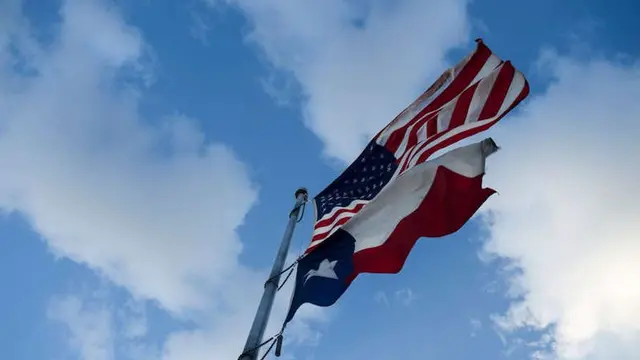A controversial GOP-backed voting bill is one step closer to becoming law after several Texas House Democrats returned to the state capital building on Thursday, ending a more than month-long boycott that brought the legislature to a halt.
The state's lower chamber barely achieved quorum Thursday night with 99 members, the exact number required after a San Antonio Democrat's resignation took effect earlier in the day.
The House only managed a quorum because three Houston Democrats returned to the state and one Republican, state Rep. Steve Allison, showed up to vote a day after testing positive for the coronavirus. Allison stayed isolated in a room away from the House chamber, according to the Texas Tribune.
The three Democrats who presented themselves had been among about 50 House Democrats who fled to Washington last month to protest a voting overhaul measure that would make substantial changes to the way Texas conducts its elections. During their Washington sojourn, the Texas legislators met with top Democrats in Washington to push for a national voting rights overhaul.
Their exodus forced a stalemate during a special session called by Gov. Greg Abbott (R), who put the voting rights overhaul on his list of priority measures to be passed during an extra 30 days in Austin. The state Senate acted on Abbott's agenda, but the absence of a quorum in the House stalled the entire session.
Abbott called another special session once the first ended, and Texas House Speaker Dade Phelan (R) threatened to have the rest of the recalcitrant Democrats arrested and brought back to the chamber to reestablish a quorum.
The Texas Supreme Court ruled on Tuesday that the Democrats could be compelled to return to Austin, even if it meant being arrested.
The members who returned - state Reps. Ana Hernandez (D), Armando Walle (D) and Garnet Coleman (D) - said they were "proud of the heroic work" Democrats had shown in blocking the bill.
"We took the fight for voting rights to Washington, D.C. and brought national attention to the partisan push in our state to weaken ballot access," the three said in a statement. "Our efforts were successful and served as the primary catalyst to push Congress to take action on federal voter protection legislation. Now, we continue the fight on the House Floor."
Privately, Texas Democrats acknowledged the stalemate was always going to be broken; Republicans hold a narrow majority in the 150-member House of Representatives, but one that is sufficient to pass their legislative agenda.
Texas law does not place a limit on the number of special sessions Abbott could call, and most House members have second jobs to supplement their legislative income, making it difficult for them to remain in unscheduled sessions.
The state House conducted only minimal business on Thursday before adjourning for the weekend. The House is expected back Monday to begin consideration of bills already passed by the state Senate, including the election overhaul. A state House committee is expected to begin work on the elections measure on Saturday.
The bill, which the Senate has now passed three times this year, would eliminate round-the-clock voting stations, place a ban on drive-through voting and give new access to poll watchers appointed by either party.
Voting rights advocates have castigated the measure as a solution looking for a problem, akin to other omnibus election reform measures passed in states like Georgia, Florida and Arizona this year by Republican legislatures.
However, members who back the provisions say they are meant to restore confidence in elections, even though no one has produced evidence of widespread fraud or malfeasance in the results of last year's presidential contest, which former President Trump lost to President Biden by a wide margin.
(THE HILL)
 简体中文
简体中文

